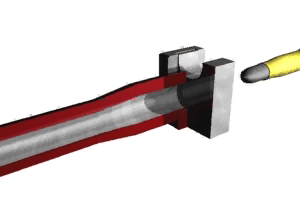Difference between revisions of "Falling block action"
m (1 revision) |
|||
| Line 1: | Line 1: | ||
| − | [[ | + | [[File:Sliding-block-action.png|thumb|300px|How it works.]] |
| − | A '''falling-block action''' (also known as a '''sliding-block action''') is a [[single-shot]] [[firearm action]] in which a solid metal [[breechblock]] slides vertically in grooves cut into the [[breech]] of the | + | A '''falling-block action''' (also known as a '''sliding-block action''') is a [[single-shot]] [[firearm action]] in which a solid metal [[breechblock]] slides vertically in grooves cut into the [[breech]] of the weapon and actuated by a lever. |
| − | When in the top position, it is locked and resists the force of [[recoil]] while sealing the chamber. In the lower position, it leaves the chamber open to be loaded by a cartridge from the rear. After loading, the lever returns the block to the top position to lock the breech in place to seal the chamber. | + | ==Description== |
| + | [[File:Ruger no1 243 right open.jpg|thumb|430px|Ruger No. 1 single-shot falling-block rifle in .243 with custom barrel with action open.]] | ||
| + | When in the top position, it is locked and resists the force of [[recoil]] while sealing the chamber. In the lower position, it leaves the chamber open to be loaded by a cartridge from the rear. After loading, the lever returns the block to the top position to lock the breech in place to seal the chamber. It is a very strong action; when the breech is closed, the receiver essentially becomes a single piece of steel (as opposed to other actions which rely on lugs to lock the breech). This type of action is used in heavy artillery as well as small arms. | ||
| − | Rifles using this action include the [[ | + | Rifles using this action include the M1870 Belgian Comblain, [[Mylonas rifle|M1872 Mylonas]], [[Sharps rifle]], [[Farquharson rifle]], [[Krag-Petersson]], [[Ballard rifle]], 1890 [[Stevens Arms|Stevens]], [[Sharps-Borchardt Model 1878]], [[Winchester Model 1885]], Browning M78 and [[Ruger No. 1]]. Falling-block action military rifles were common in the 19th century. They were replaced for military use by the faster [[bolt action]] rifles, which could reload from a [[magazine]]. |
| − | + | As well as artillery, falling-block rifles are still manufactured and used for hunting and [[target shooting]] and [[Firearm (tool)#Shotguns|industrial shotguns]] (8ga) for shooting clinkers in boilers. | |
| + | |||
| + | The falling-block action is closely related to the [[Martini-Henry]] rifle, the [[Peabody action]] (similar to, but not identical with, that of the [[Martini-Henry]]), the Ballard action, and the [[Krag-Petersson]] (uniquely, a repeater), which use a pivoting rather than a sliding block. | ||
==See also== | ==See also== | ||
*[[Bolt action]] | *[[Bolt action]] | ||
| − | *[[Lever action]] | + | *[[Lever-action]] |
*[[Pump-action]] | *[[Pump-action]] | ||
| − | *[[Break action]] | + | *[[Break-action]] |
*[[Rolling block]] | *[[Rolling block]] | ||
==References== | ==References== | ||
<references /> | <references /> | ||
| + | *McLerran, Wayne (2008). ''Browning Model 1885 Black Powder Cartridge Rifle: A Reference Manual for the Shooter, Collector & Gunsmith.'' TexasMac Publishing. ISBN 978-0-615-26561-2. | ||
==External links== | ==External links== | ||
| Line 25: | Line 30: | ||
[[Category:Firearm components]] | [[Category:Firearm components]] | ||
| − | {{stub}} | + | {{firearm-stub}} |
Revision as of 16:12, 8 August 2013
A falling-block action (also known as a sliding-block action) is a single-shot firearm action in which a solid metal breechblock slides vertically in grooves cut into the breech of the weapon and actuated by a lever.
Contents |
Description
When in the top position, it is locked and resists the force of recoil while sealing the chamber. In the lower position, it leaves the chamber open to be loaded by a cartridge from the rear. After loading, the lever returns the block to the top position to lock the breech in place to seal the chamber. It is a very strong action; when the breech is closed, the receiver essentially becomes a single piece of steel (as opposed to other actions which rely on lugs to lock the breech). This type of action is used in heavy artillery as well as small arms.
Rifles using this action include the M1870 Belgian Comblain, M1872 Mylonas, Sharps rifle, Farquharson rifle, Krag-Petersson, Ballard rifle, 1890 Stevens, Sharps-Borchardt Model 1878, Winchester Model 1885, Browning M78 and Ruger No. 1. Falling-block action military rifles were common in the 19th century. They were replaced for military use by the faster bolt action rifles, which could reload from a magazine.
As well as artillery, falling-block rifles are still manufactured and used for hunting and target shooting and industrial shotguns (8ga) for shooting clinkers in boilers.
The falling-block action is closely related to the Martini-Henry rifle, the Peabody action (similar to, but not identical with, that of the Martini-Henry), the Ballard action, and the Krag-Petersson (uniquely, a repeater), which use a pivoting rather than a sliding block.
See also
References
- McLerran, Wayne (2008). Browning Model 1885 Black Powder Cartridge Rifle: A Reference Manual for the Shooter, Collector & Gunsmith. TexasMac Publishing. ISBN 978-0-615-26561-2.

